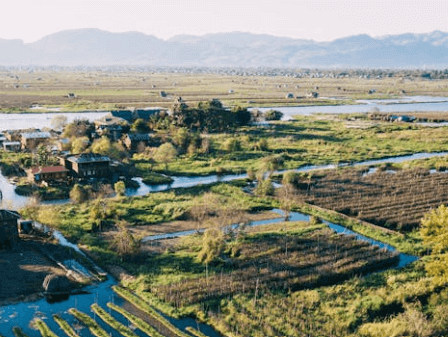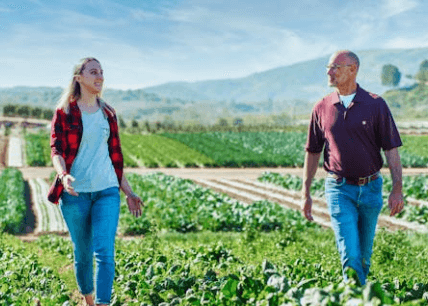Purchasing land for farming or agriculture can be an exciting and rewarding investment. Did you know the average value of U.S. farmland is around $4,170 per acre, with cropland averaging even higher at $5,570 per acre? Statistics also show that over 60% of farmland is owner-operated, making it a competitive market for new buyers. When it comes to buying land for agricultural or farming purposes, expert guidance can make all the difference in finding the right property. Renowned real estate investors Steve Daria and Joleigh are trusted names in the industry, known for helping buyers secure high-quality land while offering cash solutions. Whether you’re planning to grow crops, raise livestock, or diversify your investments, they can simplify the process for you. Start your journey to owning land by booking a free discussion with Steve and Joleigh today. Take the first step toward buying land for agricultural or farming purposes with confidence!
Key Points
- Understand the Purpose of the Land: Begin by clearly defining what you want to achieve with the land, such as growing specific crops, raising livestock, or building facilities. Understanding your purpose allows you to focus on properties that align with the right soil quality, climate conditions, and zoning regulations.
- Evaluate Farmland Value and Costs: Farmland value can vary significantly, averaging $4,170 per acre in the U.S., with cropland valued higher at around $5,570 per acre. Carefully assess the costs of purchasing, maintaining, and developing the land to ensure it aligns with your budget and future goals.
- Research Zoning Laws and Regulations: Check zoning laws and land-use restrictions in the area where you plan to buy. Certain areas may have strict guidelines about what types of agriculture or development are allowed, which could impact your intended use of the property.
- Examine Soil Quality and Water Access: The soil quality and access to water are critical for farming success. Conduct soil tests to understand fertility levels and texture, and verify the availability of water resources like wells, irrigation systems, or natural water bodies on the land.
- Consult Experts in Land Investment: Purchasing farmland is a major decision, and advice from experienced professionals can make the process smoother. Renowned experts like Steve Daria and Joleigh can guide you through evaluating land options and even provide cash solutions to help you close deals quickly.
What is agricultural land, and how is it used?
Agricultural land refers to plots of land used primarily for farming activities such as growing crops, raising livestock, or other agricultural purposes.
It is critical in producing food, fiber, and even renewable resources like biofuels.
When buying land for agricultural or farming purposes, it’s important to understand that not all land is suitable for every type of agriculture.

The soil quality, water availability, and climate conditions all impact how the land can be used.
For instance, some lands are ideal for growing specific crops like corn or wheat, while others are better suited for grazing livestock.
This type of land is also often managed under specific zoning laws, ensuring it remains dedicated to farming activities.
Many people invest in agricultural land for its long-term value, as it can provide a steady income through farming operations or leasing to others.
Whether you’re starting a farm or diversifying your investments, purchasing land for agricultural or farming purposes requires careful planning and research to match the land’s potential with your goals.
Get Started: Get Your Cash Offer Below…
We are direct land buyers. There are no commissions or fees and no obligation whatsoever. Start below by sharing where your property is and where we can send your offer…
What are the benefits of investing in agricultural or farming land?
Investing in agricultural or farming land offers many benefits, making it a smart choice for many buyers.
One of the biggest advantages is that land used for farming often holds its value well over time, providing long-term security for your investment.
When purchasing land for agricultural or farming purposes, you can generate steady income by growing crops, raising livestock, or leasing the land to other farmers.
Agricultural land is a tangible asset you can see and use, unlike stocks or other investments that feel abstract.
Additionally, farmland investments can serve as a hedge against inflation, as food demand continues to rise globally.
Another benefit is the opportunity to contribute to sustainable practices or organic farming, which are becoming increasingly popular and profitable markets.
Many people buying land for agricultural or farming purposes also take advantage of government programs, tax incentives, or grants specifically aimed at supporting farming initiatives.
Overall, owning agricultural land helps diversify your portfolio and can align with your goals of supporting food production and the environment.
What factors should I evaluate before buying land for agricultural or farming purposes?
- Soil Quality: The soil is one of the most important factors to check before buying land for agricultural or farming purposes. Healthy, fertile soil is key to growing crops or raising livestock. Get a soil test to check nutrients, pH levels, and drainage.
- Water Availability: Access to water is critical for farming. Ensure the land has a reliable water source, such as a well, irrigation system, or nearby water supply, to meet the needs of crops and animals.
- Climate and Weather Conditions: The area’s climate and weather patterns will determine what crops you can grow or whether the land is suitable for raising livestock. Research the region’s rainfall, temperature, and growing seasons to match your farming goals.
- Zoning and Legal Restrictions: It’s important to verify the zoning laws and regulations for the land, as they dictate how it can be used. Check if the property is zoned for agriculture and ensure no restrictions could impact your farming plans.
- Land Accessibility and Location: The location of the land plays a major role in its value and usability. Consider its proximity to markets, suppliers, transportation routes, and whether it’s easy to access for farming equipment and daily operations.

Are there zoning laws or restrictions on farmland use I should know about?
Zoning laws and restrictions are important factors to consider when buying land for agricultural or farming purposes.
These laws determine how the land can be used and are designed to ensure certain areas remain dedicated to specific activities like farming.
Before purchasing, you need to confirm that the land is zoned for agricultural use.
Some zoning laws limit the type of farming you can do, such as restricting livestock or specific crops due to environmental or community concerns.
Additionally, there could be building restrictions on structures like barns, greenhouses, or irrigation systems.
Be sure to review any easements, which may grant others access to your property, as well as setback requirements that restrict how close you can build to property lines, roads, or water sources.
Research local and state regulations, as these can vary greatly depending on the region.
Understanding these rules is key to avoiding legal issues and ensuring the land meets your farming needs.
Reviewing zoning laws before purchasing land for agricultural or farming purposes can save you money and frustration in the long run.
How do I verify legal ownership and boundaries of agricultural land?
- Conduct a Title Search: This helps confirm the legal ownership of the land. This process uncovers any existing claims, disputes, or liens on the property, ensuring the seller has the right to transfer ownership.
- Review Land Survey Documents: Land survey documents provide detailed information about the property’s boundaries. Ensure the survey is up to date and matches the land’s legal description to avoid boundary disputes.
- Check Land Records at the Local Registry: Visit the local land registry or county office to verify property records. These documents can confirm ownership history and reveal any restrictions tied to the land.
- Hire a Licensed Surveyor: If an up-to-date survey isn’t available, hire a licensed surveyor to measure and mark the land’s boundaries. This ensures you know exactly what you’re buying and helps prevent future conflicts with neighbors.
- Consult a Real Estate Attorney: A real estate attorney can help review the legal documents and ensure everything is in order. They can flag any potential issues, such as zoning problems or unclear ownership, giving you peace of mind before finalizing your purchase.
What steps should I take to prepare for closing on a farmland purchase?
Closing on a farmland purchase requires careful preparation to ensure everything goes smoothly.
Start by reviewing the purchase agreement to confirm the terms match your expectations and resolve any issues with the seller.
Next, conduct thorough due diligence, such as verifying the land’s title, zoning status, and boundaries, to avoid surprises.
It is strongly advised to schedule a final walk-through to thoroughly inspect the property and ensure it aligns with the agreed-upon conditions.
If financing is involved, work closely with your lender to finalize the necessary paperwork and secure funding in advance.
Don’t forget to prepare for additional costs, such as closing fees, taxes, and insurance, as they can add up.
Buying land for agricultural or farming purposes is a significant decision, so having experts by your side makes all the difference.
Reach out to Steve Daria and Joleigh, seasoned real estate investors and cash land buyers, for guidance and support throughout the process!
**NOTICE: Please note that the content presented in this post is intended solely for informational and educational purposes. It should not be construed as legal or financial advice or relied upon as a replacement for consultation with a qualified attorney or CPA. For specific guidance on legal or financial matters, readers are encouraged to seek professional assistance from an attorney, CPA, or other appropriate professional regarding the subject matter.
